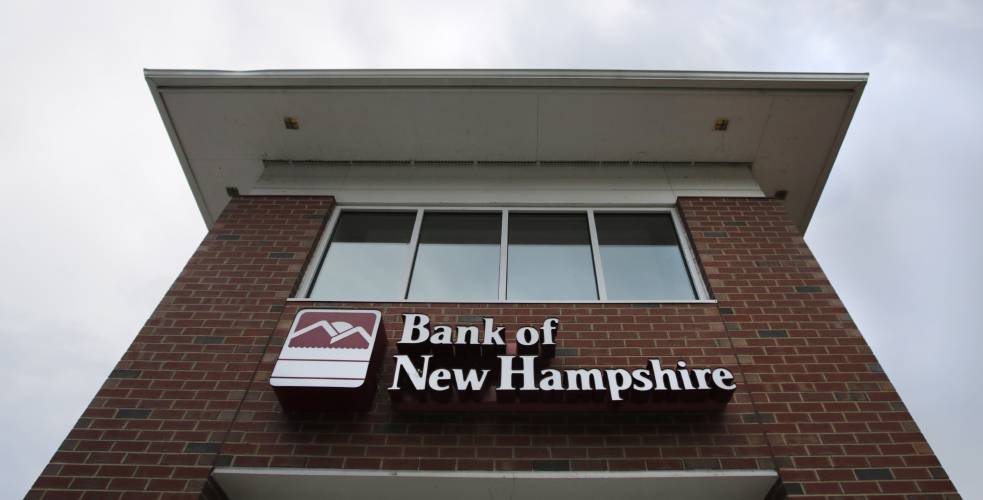Opinion: Bankers have the NH Public Deposit Investment Pool in their sights

Clouds pass over the Bank of New Hampshire branch in Manchester, N.H., Monday, Aug. 19, 2019. Charles Krupa/ AP
| Published: 04-17-2024 6:00 AM |
Todd Selig is the longtime town manager in Durham.
Senate Bill 553 would require public funds from localities be invested in NH banks, where the NH Bankers Association, the lobbying arm for the banks, argues that according to a study it commissioned, the money would better serve the state’s economy by investing it with them, versus through investment with its competitor, the NH Public Deposit Investment Pool (“the Pool”). The assumptions behind the bill are speculative at best and will likely result in dismantling the Pool, harming public entities and local taxpayers.
The Pool was wisely created more than 30 years ago by our legislature after the state’s five largest banks failed and the FDIC became the single biggest property owner in NH. Today, pursuant to RSA 6:45-47, the Pool is operated by the state treasurer with the assistance of an advisory committee.
The Pool offers public entities, including but not limited to municipalities, counties, school districts, trustees of trust funds, commissions, agencies, and the state itself an option for investing public funds in a program that focuses on safety, liquidity, and a competitive return. The Pool is rated AAAm by Standard and Poor’s Ratings Services, indicating excellent safety of investment principal and a superior capacity to maintain a $1 per share net asset value.
The Pool serves as a voluntary, state-managed investment option, separate and distinct from banks. Each public entity can pool its excess reserves with those of other government entities in an operation much like a money market mutual fund, but with the added benefit of being structured to meet the unique needs of government investors. Although all funds are pooled for investment purposes, each entity’s participation in the pool is reported separately and each earns the same rate of return, regardless of population size or dollars invested.
The banks claim funds in the Pool are not safe because they are not insured or collateralized. This is misleading. Monies within the Pool are invested directly in securities held in the name of the Pool and permitted by the investment policy. There’s no requirement to collateralize simply because of the direct nature of the investments. A purchase of securities issued by the United States, federal agencies, commercial paper, etc. differs from bank deposits or repurchase agreements in that the Pool owns the security itself. Collateralization of bank deposits or repurchase agreements at banks are required because of the uncertainty regarding bank or counterparty failures. The investment types purchased by the Pool are not without risk, but the same can be said for the securities banks post as collateral on deposits or for their own accounts.
The banks contend SB 553 would open up $182 million in additional NH business lending, primarily benefitting small businesses with 50 employees or fewer. But there are no requirements in the bill for the banks to actually loan these public deposits in NH. Furthermore, the three largest banks that operate in the state, holding 55% of all public deposits, are national banks (TD Bank, Citizens Bank, and Bank of America). And the group of NH-chartered banks already have excess reserves that they could lend, according to FDIC data. In some cases, this excess cash is invested at the Federal Reserve, making additional interest for the banks and their shareholders, not public entities and indirectly local taxpayers.
The Pool’s operating model is to accept a public entity’s deposit when presented and pay it back the day requested at the published interest rate, which is the same for all investors. Conversely, banks do not have to pay the same interest rate to each depositor and may use how long funds remain deposited to determine a rate and even whether to take the deposit at all.
Article continues after...
Yesterday's Most Read Articles
 After four decades collecting carts, Ricky Tewksbury will retire when Shaw’s closes mid-April
After four decades collecting carts, Ricky Tewksbury will retire when Shaw’s closes mid-April
 ‘If you’re proud of it, we want to see it’: Cars & Coffee on Capitol returning to Concord
‘If you’re proud of it, we want to see it’: Cars & Coffee on Capitol returning to Concord
 Ahead of House vote, Democrats rally for a ‘better budget’ to fund education, healthcare and more
Ahead of House vote, Democrats rally for a ‘better budget’ to fund education, healthcare and more
 High school girls’ lacrosse previews: Former Hopkinton coach Zahn takes over Concord rebuild
High school girls’ lacrosse previews: Former Hopkinton coach Zahn takes over Concord rebuild
 Mental health funding facing House cuts, drawing concern
Mental health funding facing House cuts, drawing concern
 ‘A wild accusation’: House votes to nix Child Advocate after Rep. suggests legislative interference
‘A wild accusation’: House votes to nix Child Advocate after Rep. suggests legislative interference
According to the Public Funds Investment Institute, the restrictions that SB 553 would place on the Pool would make it unlikely that the Pool would continue to operate. That would result in fewer competitive options for NH public entities exercising their fiduciary responsibility on behalf of taxpayers to maximize investment interest while also ensuring safety of principal. The Pool opened 226 new accounts in the 2023 fiscal year, indicating significant interest in the Pool. Due to the Pool’s success, NH banks have had the Pool and the $680 million in public funds invested there in their sights for a few years.
The Pool has operated for more than 30 years without losing a penny of public funds. The legislature should preserve the status quo and allow the Pool to continue serving public entities as a viable alternative investment option to the banks. If banks want to win back business, all they need to do is increase interest rates and terms to match the Pool. That’s competition, which is good for NH.







 Opinion: An attack on the legal profession is an attack on us all
Opinion: An attack on the legal profession is an attack on us all Opinion: HealthTrust's decision to drop anti-obesity medications is a step back in the fight against a chronic disease
Opinion: HealthTrust's decision to drop anti-obesity medications is a step back in the fight against a chronic disease Opinion: Courage and care count
Opinion: Courage and care count
